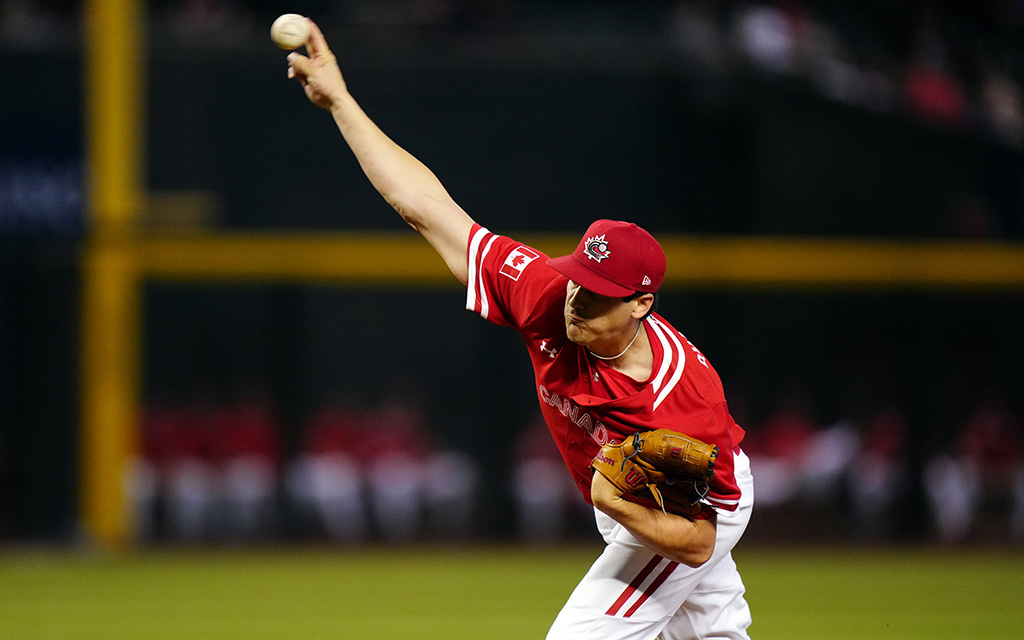PHOENIX – With an average squad age of 29, and 21 years separating 19-year-old pitcher Mitch Bratt from 40-year-old pitcher John Axford, Team Canada faced a numbers game.
While Canada had battled through four games at the World Baseball Classic, one of the biggest challenges it faced was inconsistent pitching.
However, while it appeared that the choice to throw young pitchers on the mound in earlier contests may have cost Canada a future in the tournament, Tuesday’s 5-0 rebound win over Team Colombia helped steady the course for a day.
Even with the experienced arms in the bullpen, age was a major factor in not being able to keep up with Team Mexico Wednesday, sending Team Canada packing after the 10-3 loss.
Team Canada manager Ernie Whitt attributed Wednesday’s defeat to the youth of the team, but with four pitchers in relief who share a median age of 33, youth doesn’t seem to be the only factor behind Team Canada’s early departure.
“This is a big stage. A lot of these guys are pitching in A ball, maybe Double-A. It’s a big stage for them. And they had been throwing the ball well, our exhibition games and pretty much the guys had pitched earlier, they were throwing well,” Whitt said. “Today there were a couple guys we didn’t want to face with runners in scoring position, but we didn’t have places to put the guy. That hurt us.”
Wednesday’s starter Rob Zastryzny said going into the game that the mood in the clubhouse was good, but the team was ready to win.
“The mood is good. Like he (Whitt) said, a tough loss (Tuesday) but a lot of guys have been in situations like this before,” Zastryzny, 30, said. “This isn’t new to a lot of us. And we’re just ready to go out there, take it game by game and try to win this thing.”
Although Mexico’s offense saw right through Zastryzny’s pitches, the 30-year-old only lasted two innings allowing three runs, two walks and two strikeouts.
With that, Whitt put in his veteran relievers, however age started to show and with 34-year-old Phillippe Aumont and 37-year-old Andrew Albers coming in relief, it was only a matter of time before the bats started to come alive for Team Mexico.

Mitch Bratt allowed six earned runs in 25 pitches Monday night against Team USA but helped reset Team Canada’s rotation. (Photo by Daniel Shirey/WBCI/MLB Photos via Getty Images)
Every reliever that came in for Team Canada allowed a run besides 28-year-old Trevor Bridgen.
“I think it showed a little bit today, inexperience. But I’m proud of every guy in that room. They played the game the way it was supposed to be played. They played with pride and passion. What more can you ask for,” Whitt said.
That inexperience showed earlier in the tournament when Bratt started against an overpowered United States squad Monday.
Some thought that Bratt was hung out to dry – he was charged with six earned runs in a third of an inning in the 12-1 loss – but at the end of the day, Whitt said the decision came down to giving Bratt a chance, even if that meant an early exit.
Although there is still a lot of work to be done with Team Canada’s bullpen before the next WBC – four pitchers possessed an ERA of over 20.00 throughout tournament play while seven hurlers are over the age of 30 – the grit and determination of the pitching staff shows a bright future for 2026.
The ever-growing chemistry within the pitching staff has allowed many of the younger members to soak in every opportunity to learn from those with major league experience.
Cleveland Guardians pitcher Cal Quantrill has been giving advice to Bratt in particular, and although there is a nine-year age difference between the two, Bratt said the advice is extremely helpful when facing an All-Star roster like Team USA’s.
“I just think with all the younger players – and I don’t claim to have answers, I’m still figuring it out as I go – but you don’t change because the moment has changed,” Quantrill, 28, said. “What you’ve done and what you’ve accomplished to get to the spot where you were invited to this team is enough. Just go out and be yourself. Don’t worry about what name’s on the back of their jerseys. It was the same way you were getting high school kids out last year. It’s the same way as you’re going to try to get these guys out.”
Bratt said having mentors like Axford and other veterans with experience has been a rewarding experience in his first time representing Canada, and hopes that speaking about his time at the WBC will further inspire those who are next to come up in Canadian baseball.
“It’s definitely a great experience. They’ve really been real good mentors and people to talk to about their experiences and the stuff they’ve been through,” Bratt said before his start against Team USA. “Hopefully it can kind of help out the next wave of who’s going to be coming up as players.”
With six players on the roster being born in the year 2000 or later, the sky’s the limit as to what will happen in 2026, but for now, Whitt is excited to see what’s to come in the future of his young Canadian squad.
“Hopefully this was a great experience for them, number one. And next time they play in it they will not only have played a few more years in the minor leagues or the big leagues, this is going to help them down the road,” Whitt said. “And I think that I’m very confident that the team will bounce back in 2026 and be a force.”

